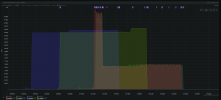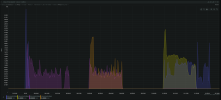I start this software #top -f -F 1
And then with "L" I change to see all disks and CPU. In the benchmark time you can see disk activity and you can compare do all disk are busy equally and what is CPU activity.
I haven't tested this yet, but I went back a step and benchmarked the individual disks again.
This is the result of the fio benchmark with the same settings as above.
The disks are formatted here with ext4
nvme2 and nvme3 are the two Kioxia and nvme0 and nvme1 are the Lexar

And here is the result with ZFS.
The first block is the Lexar, the second the Kioxia and the third the Kioxia again, but this time with 1MB / 4MB recordsize

On the one hand, I'm very surprised that the Kioxia can permanently (over 15 minutes) reach the approx. 3400MB/s when formatted with ext4.
And on the other hand, the performance then drops very sharply to approx. 1000MB/s with these
(Also with the Lexar, but not as much there, because they already had significantly less performance in the ext4 benchmark than the Kioxia).
Does anyone have an explanation for this, especially for the big drop with the Kioxia devices?




